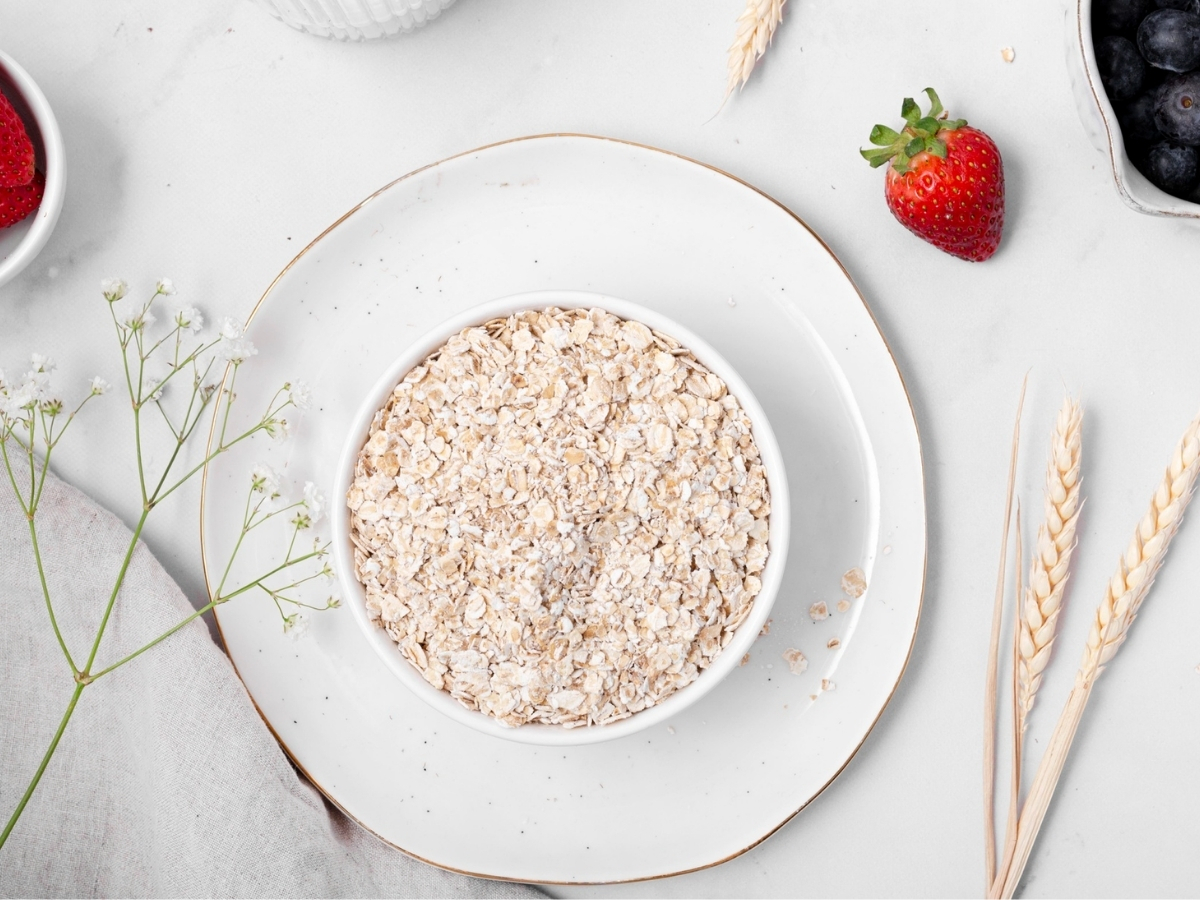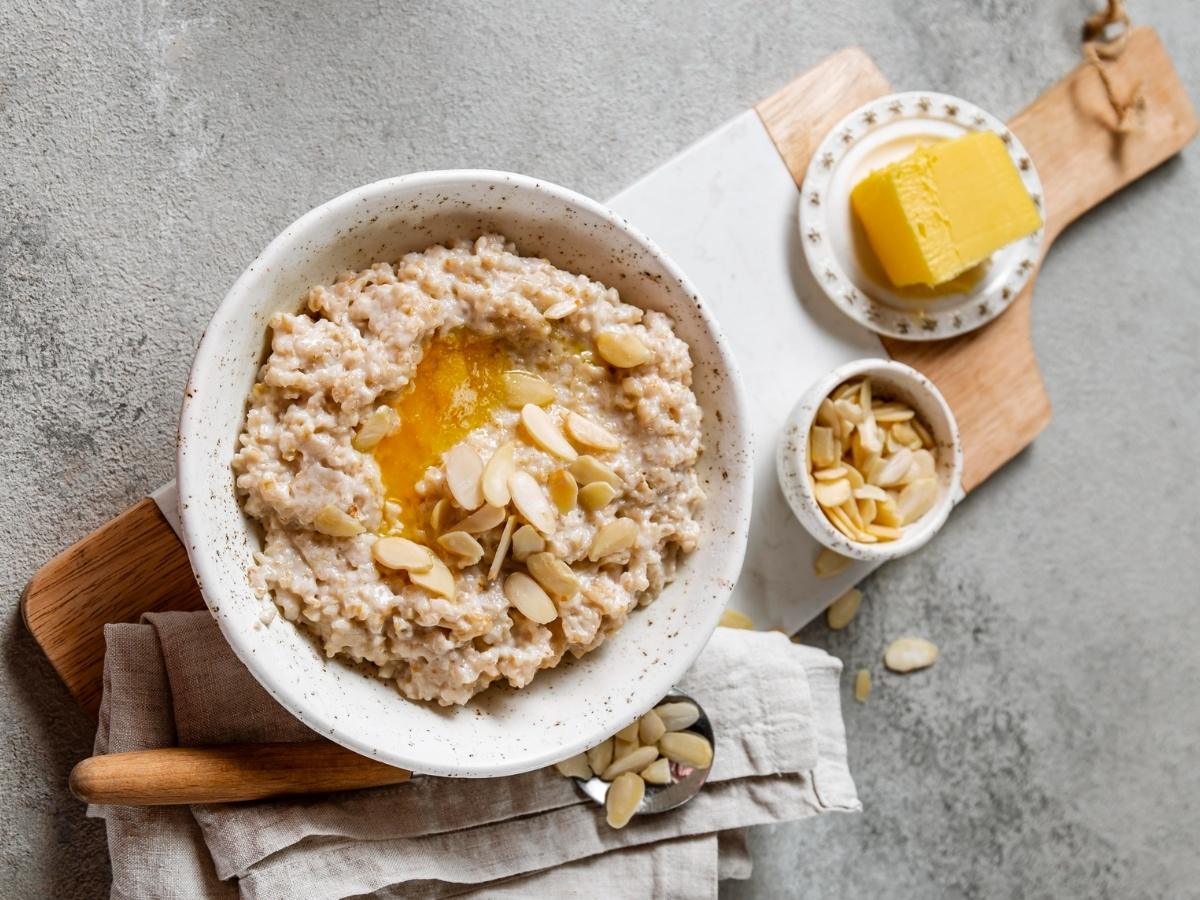At Natural Health, we often hear the question: “Is Quaker oats good for diabetes?” The answer is yes, when chosen and prepared correctly, Quaker oats (Oatmeal) can be a smart addition to a diabetes-friendly diet. Rich in soluble fiber and low to moderate on the glycemic index, they can help stabilize blood sugar, improve insulin response, and support overall metabolic health.
Is quaker oats good for diabetes?
Yes, quaker oats (oatmeal) are good for diabetes. Oatmeal is rich in soluble fiber, especially beta-glucan, which slows digestion and helps control blood sugar.[1] It also provides magnesium, zinc, and antioxidants, nutrients that support insulin function and help reduce inflammation, both of which are important in diabetes management.

Read more: Is peanut butter good for diabetes? The Expert answers
Pros and Cons of quaker oats for diabetes
Wondering “Is quaker oats good for diabetes”? Let’s take a closer look at the pros and cons of including it in a diabetes-friendly diet, so you can make informed choices that support your blood sugar goals.
Pros of quaker oats for diabetes
Quaker oats aren’t just convenient, they also offer real benefits for people managing diabetes. Let’s take a look at why they’re a smart choice.
- Rich in Soluble Fiber: Quaker oats are a good source of beta-glucan, a type of soluble fiber that helps slow down digestion and glucose absorption, leading to better post-meal blood sugar control.[2]
- Helps Improve Insulin Sensitivity: Studies have shown that regular oat consumption can improve insulin response in people with type 2 diabetes, potentially reducing insulin resistance.[3]
- Supports Heart Health: People with diabetes are at higher risk of heart disease. Oats help lower LDL (bad) cholesterol, reduce blood pressure, and support vascular health, all of which are important for diabetic care.[4]
- Promotes Satiety and Weight Management: Thanks to their fiber content, oats help you feel full longer, reducing the likelihood of overeating and helping with weight control, an important factor in managing type 2 diabetes.[5]
- Low to Moderate Glycemic Index (GI): According to the Harvard T.H. Chan SOPH that less processed oatmeal has a lower glycemic index, even though it’s relatively high in carbs.[6]
Do you know pineapple is good for diabetes?
Cons of oatmeal for diabetes
While plain oatmeal, such as quaker oats, can offer benefits for blood sugar control, there are some drawbacks to consider, especially depending on the type of oats and how they’re prepared.
- High in Carbohydrates: Even though oats contain beneficial fiber, they are still relatively high in carbohydrates (about 27g per 1/2 cup of dry oats).[1] For some people with diabetes, this may cause a blood sugar spike, especially if portions are too large or not paired with protein or fat.[7]
- Instant or Flavored Oatmeal Can Be Harmful: Many instant or flavored quaker oats contain added sugars, artificial flavors, and less fiber due to processing. These versions often have a higher glycemic index, which can raise blood sugar more quickly.[8]
- Overeating Is Easy: quaker oats may cause a rise in blood sugar, especially if you opt for instant varieties with added sugars or eat large portions in one sitting.[9]
- Can Cause Digestive Issues for Some: Quaker oats soluble fiber is generally beneficial, but in some individuals it may cause bloating or gas, especially when suddenly increasing fiber intake.
How to prepare quaker oats for diabetes
Quaker oats are good for diabetes, especially when it’s used to replace breakfast foods that are high in sugar and refined carbs.
The way you choose and prepare oats can make a big difference in how healthy the meal is. Here are some tips:[10]
- Choose old-fashioned or steel-cut oats: These types are less processed and contain more soluble fiber, which helps slow digestion and keeps blood sugar more stable.
- Add protein or healthy fats: Combine quaker oats with foods like eggs, nut butter, or Greek yogurt. You can also mix in 1–2 tablespoons of nuts (such as walnuts, almonds, or pecans) to help prevent blood sugar spikes.
- Sprinkle some cinnamon: Cinnamon is rich in antioxidants and may help reduce inflammation and support heart health.
- Top with berries: Berries add natural sweetness and are full of vitamins and antioxidants without causing a big blood sugar spike.
- Use low-fat milk, milk alternatives, or water: Cooking oats with low-fat or soy milk adds nutrients without too much fat. If you want to cut down on calories and carbs, use water instead.
- Consider low-sugar protein powder: Adding protein powder can boost your protein intake, especially if you cook oats with water. Just make sure it’s low in sugar.

Frequently asked questions
Can a diabetic eat Quaker oats?
Yes, Quaker oats are good for diabetes, especially the plain, unflavored varieties. Quaker oats are a good source of soluble fiber, particularly beta-glucan, which helps slow down digestion and reduce blood sugar spikes after meals.[1]
Answers: Can diabetics eat oranges at night?
Which oats are best for diabetic patients?
Steel-cut oats and old-fashioned rolled oats are the best choices. They are less processed, have a lower glycemic index, and are high in fiber, which helps control blood sugar.[2]
Is instant oatmeal good for diabetics?
Not the best choice. Instant oatmeal is often highly processed and may contain added sugars, which can cause faster spikes in blood sugar.[11]
So, is Quaker oats good for diabetes? Absolutely, as long as you choose the right type (like old-fashioned or steel-cut), avoid sugary instant varieties, and pair it with protein or healthy fats. With the right preparation, Oatmeal can help support blood sugar control, promote satiety, and contribute to a heart-healthy diet. Let’s go natural, go holistic, go Natural Health.


Last medically reviewed on
How we reviewed this article:
Reference
[1] Cereals, oats, regular and quick, not fortified, dry; U.S. Department of Agriculture Agricultural Research Service; 2019
[2] Cholesterol-lowering effects of oat β-glucan: a meta-analysis of randomized controlled trials; Anne Whitehead, Eleanor J Beck, Susan Tosh, Thomas M S Wolever; 2014
[3] Oat Intake and Risk of Type 2 Diabetes, Cardiovascular Disease and All-Cause Mortality: A Systematic Review and Meta-Analysis; Faina Wehrli, Petek E Taneri, Arjola Bano, Lia Bally, Lauren C Blekkenhorst, Weston Bussler, Brandon Metzger, Beatrice Minder, Marija Glisic, Taulant Muka, Hua Kern; 2021
[4] Estimating the effect of nutritional interventions using observational data: the American Heart Association’s 2020 Dietary Goals and mortality; Yu-Han Chiu, Jorge E Chavarro, Barbra A Dickerman, JoAnn E Manson, Kenneth J Mukamal, Kathryn M Rexrode, Eric B Rimm, Miguel A Hernán; 2021
[5] Dietary fiber and satiety: the effects of oats on satiety; Candida J Rebello, Carol E O’Neil, Frank L Greenway; 2016
[6] Oats; Harvard T.H. Chan School of Public Health
[7] Evaluation of the Effect of Macronutrients Combination on Blood Sugar Levels in Healthy Individuals; Berrak BASTURK, Zeynep KOC OZERSON, Aysun YUKSEL; 2021
[8] Dietary Sugar Intake and Incident Type 2 Diabetes Risk: A Systematic Review and Dose-Response Meta-Analysis of Prospective Cohort Studies; Karen A Della Corte, Tyler Bosler, Cole McClure, Anette E Buyken, James D LeCheminant, Lukas Schwingshackl, Dennis Della Corte; 2025
[9] food and diet; Diabetes Action Research and Education Foundation
[10] How to Enjoy Oatmeal If You Have Diabetes; Medically reviewed by Kathy W. Warwick, RDN, CDCES; 2023
[11] Effect of adding oat bran to instant oatmeal on glycaemic response in humans – a study to establish the minimum effective dose of oat β-glucan; Thomas Wolever, Alexandra Jenkins, Kevin Wynn Prudence, Jodee Johnson; 2018
Share this article
Read this next
Is water lemon good for diabetes? What should you know
Lemon water is good for diabetes, not just because it’s refreshing, but because it offers real support for blood sugar control. With zero added sugar, rich in vitamin C and antioxidants, it may help improve hydration, aid digestion, and reduce post-meal blood sugar spikes. At Natural Health, we break down how to make lemon water…
Apple cider vinegar for diabetes: The research says and tips to use
At Natural Health, we explore the growing interest in apple cider vinegar for diabetes. Studies suggest it may help improve insulin sensitivity and lower blood sugar levels after meals. This article explains how apple cider vinegar works, how to use it safely, and what people with diabetes need to know before adding it to their…
Is sweet corn good for diabetes? Dietitians explain
At Natural Health, we know many people managing blood sugar often ask, is sweet corn good for diabetes? The short answer: YES, with the right portion. Corn contains fiber, vitamins, and antioxidants that support overall health. In this guide, we break down how corn fits into a diabetes-friendly diet and how to enjoy it without…